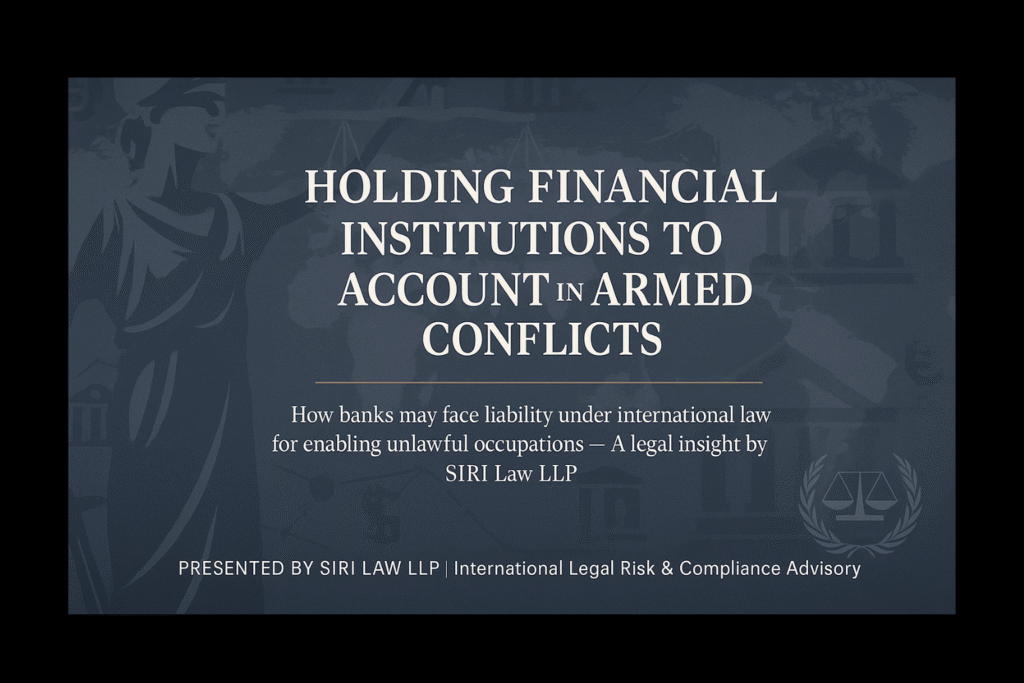
In a historic step toward strengthening accountability in armed conflicts, a submission to the International Criminal Court (ICC) calls for an investigation into the role of banks and financial institutions in sustaining unlawful occupations. This initiative marks a significant evolution in international justice, shifting the focus beyond direct perpetrators of violence to include those whose commercial activities underpin and enable illegitimate administrations.
The Complaint: Expanding the Circle of Accountability
Since the Russian invasion of Ukraine in early 2022, occupied territories such as Kherson have witnessed the dismantling of local governance structures — including the financial sector — and their replacement with systems controlled by the occupier. Banks and financial service providers reportedly engaged in activities such as:
- Converting local currency to that of the occupying state.
- Managing payrolls for occupying forces and administration staff.
- Extending credit and other financial support to enterprises aligned with the occupation regime.
These actions effectively created the financial backbone for maintaining control over the occupied population. The legal complaint submitted to the ICC argues that such conduct constitutes aiding and abetting war crimes and crimes against humanity, given that the financial institutions knowingly supported a system imposed in violation of international humanitarian law (IHL).
Legal Framework: Responsibility Under the Rome Statute
The Rome Statute, the founding treaty of the ICC, holds individuals criminally responsible for aiding, abetting, or otherwise assisting in the commission of crimes within the Court’s jurisdiction. The submission frames the banks’ role in three legal constructs:
1. Aiding and Abetting
By deliberately facilitating the flow of resources, services, and infrastructure that sustain illegal governance and repression, financial institutions materially contribute to violations such as forced displacement, illegal annexation, and expropriation of property.
2. Joint Criminal Enterprise (JCE)
When banks act in concert with occupying authorities and other collaborators to achieve a common unlawful purpose – such as consolidating control over a population – they may collectively form a JCE, in which each participant bears responsibility for the enterprise’s crimes.
3. Individual Criminal Responsibility
Decision-makers, including board members and senior executives, may face individual accountability if they authorised, facilitated, or failed to prevent financial activities that contributed to sustaining the occupation.
This case underscores that organizational liability does not shield individuals from prosecution when their actions or omissions contribute to criminal conduct.
Broader Implications: The End of Assumed Neutrality
For decades, financial institutions have operated under an assumption of political neutrality, focusing primarily on commercial risk and regulatory compliance. The ICC complaint signals a new era in which the financial sector’s actions – or inactions – may be scrutinised for their complicity in human rights violations and breaches of IHL.
This development has wide-reaching implications:
- Regulatory and Legal Risk: Banks may face investigations, sanctions, or prosecution under domestic and international law if their services support unlawful regimes.
- Reputational Risk: Stakeholders, including investors, customers, and advocacy groups, increasingly demand that financial institutions uphold ethical standards aligned with global norms.
- Operational Risk: Occupied or conflict-affected markets now pose higher compliance and governance risks, potentially threatening business continuity.
Key Lessons for Financial Institutions
To navigate this evolving legal and ethical landscape, institutions must recalibrate their risk management, governance, and compliance frameworks to incorporate IHL and human rights considerations.
Enhanced Risk Assessments
- Incorporate geopolitical and humanitarian law criteria into market-entry and client-onboarding risk models.
- Monitor political control and potential human rights impacts in regions of operation.
Strengthened Compliance Frameworks
- Augment sanctions and anti-money laundering (AML) controls with screening tools specifically designed to flag transactions and entities linked to occupied territories.
- Establish early-warning mechanisms to detect patterns that suggest support for unlawful governance structures.
Active Board and Executive Oversight
- Directors and senior leaders must ensure that corporate policies explicitly prohibit facilitation of unlawful occupation or repression.
- Governance mechanisms should include documented due diligence processes and periodic independent reviews to demonstrate good faith compliance.
Independent Audits and Transparent Reporting
- External audits of conflict-related exposure help institutions identify vulnerabilities and enhance accountability.
- Public disclosures regarding operations in conflict zones can build stakeholder trust and deter allegations of complicity.
Best Practices for Ethical Conduct
Institutions can adopt proactive measures to align business practices with international norms:
- Form cross-functional committees (legal, compliance, risk, and human rights experts) to assess complex cases.
- Deploy dynamic, real-time sanctions databases that reflect rapidly changing political realities.
- Conduct enhanced due diligence on all intermediaries, agents, and correspondent banks with potential exposure to occupied regions.
- Implement scenario-based training to equip employees with the knowledge to identify and escalate problematic transactions.
- Engage with regulators, industry groups, and intergovernmental organisations to share knowledge and remain ahead of emerging standards.
Looking Ahead: A Paradigm Shift
The ICC submission concerning financial institutions’ role in Ukraine represents a turning point in the relationship between finance and international law. In a globally interconnected financial system, the lines between commercial activity and complicity in international crimes are becoming sharper.
This evolving accountability landscape demands that financial institutions acknowledge their role not only as economic actors but also as participants in a global community governed by law and ethics. Those that proactively embed human rights and humanitarian considerations into their operations will not only mitigate legal and reputational risks but also reinforce their legitimacy and long-term sustainability.
Conclusion
The era of assumed neutrality is over. Financial institutions must recognise that in conflict zones, their decisions – whether active or passive – carry weight in the context of international humanitarian and criminal law. By strengthening compliance, oversight, and ethical governance, institutions can contribute to upholding fundamental norms, protect their stakeholders, and avoid becoming entangled in the machinery of oppression.
Those who rise to this challenge will emerge as leaders in ethical finance, while those who ignore it risk not only their reputation but also their very license to operate in the global marketplace.
About SIRI Law LLP
At SIRI Law LLP, we specialise in translating complex international legal developments into actionable guidance for clients across the financial services, banking, insurance, investment, fintech, and corporate sectors. Our services include:
- Designing and implementing robust anti-money laundering (AML) and counter-terrorist financing (CTF) programmes.
- Advising on compliance with international sanctions, export controls, and conflict-related regulations.
- Conducting comprehensive conflict-risk assessments and operational due diligence.
- Structuring corporate governance frameworks to address emerging obligations under international humanitarian and human rights law.
- Delivering tailored training for boards, executives, and compliance teams on managing legal, ethical, and reputational risks.
Our interdisciplinary team combines expertise in international criminal law, corporate governance, regulatory compliance, and risk management to help clients build resilient and ethical business practices aligned with evolving global standards.
For more information or to discuss how we can help your organisation navigate these challenges, reach out to us.

